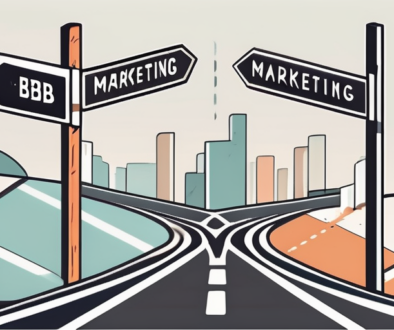The Meaning of B2B Slang
B2B slang, also known as business-to-business slang, is a specialized form of language that has emerged within the world of corporate communication. In this article, we will explore the intricacies and significance of B2B slang, and its impact on various aspects of business relationships. From understanding the importance of B2B slang in everyday communication to decoding its usage in specific industries, we will delve into its role in fostering professionalism and navigating cultural differences. So, let’s dive in and unravel the meaning behind B2B slang.
Understanding B2B Slang
Before we explore the different aspects of B2B slang, it’s crucial to grasp its essence and why it has become an integral part of business communication. B2B slang is a collection of familiar terms and phrases used among professionals within the same industry or across industries. It serves as a shorthand language, allowing individuals to quickly convey complex ideas and concepts. This shared language not only makes communication more efficient but also helps build a sense of community among business peers.
The Importance of B2B Slang in Business Communication
Effective communication is crucial in any business setting. B2B slang plays a significant role in enhancing communication within organizations and between industry professionals. It allows individuals to convey messages concisely and accurately, saving valuable time in the fast-paced business world. Moreover, B2B slang fosters a sense of belonging and camaraderie among professionals, facilitating smoother collaboration and information exchange.
Commonly Used B2B Slang Terms
Within the realm of B2B slang, there are numerous commonly used terms that have become second nature to professionals. These terms, often originating from specific industries, serve as convenient shortcuts in conversations. Some examples include “KPI” (Key Performance Indicator), “ROI” (Return on Investment), “SaaS” (Software as a Service), and “B2C” (Business to Consumer). Understanding and utilizing these terms appropriately is essential for effective communication within the business landscape.
Let’s delve deeper into some of the most commonly used B2B slang terms:
1. KPI (Key Performance Indicator)
KPIs are measurable values that help businesses track their progress towards achieving specific goals. These indicators provide a clear understanding of performance and enable organizations to make informed decisions. By using the term “KPI,” professionals can quickly refer to these crucial metrics without going into lengthy explanations.
2. ROI (Return on Investment)
ROI is a financial metric used to evaluate the profitability of an investment. It measures the return or gain generated from an investment relative to its cost. By using the term “ROI,” professionals can easily discuss the financial impact of various business decisions and assess the effectiveness of their investments.
3. SaaS (Software as a Service)
SaaS refers to a software delivery model where applications are hosted by a service provider and accessed by users over the internet. This model eliminates the need for organizations to install and maintain software on their own servers. By using the term “SaaS,” professionals can quickly refer to this popular software delivery method, saving time and avoiding confusion.
4. B2C (Business to Consumer)
B2C refers to business transactions that occur between a company and individual consumers. It involves selling products or services directly to end-users. By using the term “B2C,” professionals can easily differentiate between business-to-business (B2B) and business-to-consumer (B2C) interactions, ensuring clarity in discussions and strategies.
These are just a few examples of the vast array of B2B slang terms used in the business world. Understanding and utilizing these terms appropriately not only enhances communication but also showcases your expertise and familiarity with industry-specific language.
Decoding B2B Slang
While B2B slang is present across various aspects of business communication, it assumes distinct forms in different contexts. Let’s explore its role in marketing and sales.
B2B Slang in Marketing
In the dynamic world of marketing, B2B slang plays a vital role in conveying innovative marketing strategies and tactics. Terms such as “content marketing,” “lead generation,” and “brand awareness” are commonly used among marketers to discuss and analyze their campaigns. Understanding these terms allows marketing professionals to stay on top of industry trends and effectively communicate their ideas to colleagues and clients.
Moreover, B2B slang in marketing extends beyond just terminology; it reflects the evolving landscape of digital marketing. Phrases like “SEO optimization,” “PPC advertising,” and “social media engagement” have become essential components of modern marketing jargon. By embracing and utilizing these terms, marketing teams can navigate the complexities of online advertising, search engine algorithms, and social media platforms with finesse.
B2B Slang in Sales
In the realm of sales, B2B slang helps professionals discuss their strategies and techniques succinctly. Terms such as “cold calling,” “pipeline,” and “upselling” are frequently used to capture various aspects of the sales process. Familiarity with these terms enables sales teams to streamline their communication, benchmark their progress, and align their objectives more efficiently.
Furthermore, B2B slang in sales reflects the nuances of relationship-building and customer acquisition. Phrases like “relationship selling,” “consultative selling,” and “value proposition” underscore the importance of personalized interactions and tailored solutions in the sales cycle. By incorporating these terms into their discussions and strategies, sales professionals can cultivate stronger client relationships, drive revenue growth, and differentiate themselves in a competitive marketplace.
The Role of B2B Slang in Industry Jargon
Beyond its usage in specific departments, B2B slang also plays a significant role in industry-specific jargon. Different industries have developed their own unique set of terms and phrases that are specific to their field.
Understanding the nuances of B2B slang within various industries is crucial for professionals looking to excel in their respective fields. It not only facilitates smoother communication but also fosters a sense of belonging within the industry community.
B2B Slang in the Tech Industry
In the rapidly evolving world of technology, B2B slang is particularly prevalent. Terms such as “API,” “cloud computing,” and “machine learning” have become ubiquitous in tech discussions. The usage of these terms not only expedites communication among professionals but also signifies a shared understanding of the latest technological advancements.
Moreover, the tech industry’s B2B slang often reflects the cutting-edge nature of the sector, with new terminologies emerging as technology evolves. Professionals in this field must stay abreast of these developments to remain competitive and innovative.
B2B Slang in the Finance Industry
The finance industry also has its fair share of B2B slang. Terms like “M&A” (Mergers and Acquisitions), “ROI” (Return on Investment), and “hedge fund” are commonly used within financial circles. Familiarity with this industry-specific slang is essential for professionals to navigate complex financial transactions and communicate effectively with clients and stakeholders.
Furthermore, the finance industry’s B2B slang often reflects the intricate and multifaceted nature of financial dealings. Professionals must not only grasp the technical aspects of these terms but also understand the strategic implications they carry in the realm of finance.
The Impact of B2B Slang on Business Relationships
Beyond its functional aspects, B2B slang also has a profound impact on business relationships.
Exploring further, it’s fascinating to note how B2B slang not only serves as a communication tool but also plays a significant role in shaping the dynamics of professional interactions. The nuances embedded within industry-specific jargon can convey a deeper level of understanding and expertise, elevating conversations and fostering a sense of camaraderie among professionals.
The Influence of B2B Slang on Professionalism
Using B2B slang appropriately demonstrates professionalism and expertise within a particular industry. When professionals speak the same language, it creates a sense of credibility and authority. Employing these terms correctly showcases competence and establishes trust, enhancing business relationships and fostering collaboration.
Moreover, mastering B2B slang requires a keen awareness of industry trends and evolving terminology. Staying abreast of the latest jargon not only demonstrates a commitment to continuous learning but also showcases adaptability and a proactive approach to professional development.
The Role of B2B Slang in Networking
In networking situations, understanding and using B2B slang can be highly advantageous. When professionals from different organizations gather at industry events, conferences, or networking sessions, speaking the same language strengthens connections. Shared familiarity with B2B slang facilitates meaningful conversations, establishes common ground, and opens doors to new business opportunities.
Furthermore, the strategic deployment of B2B slang in networking scenarios can serve as a powerful icebreaker, instantly creating a sense of belonging and rapport among participants. Leveraging industry-specific terminology not only showcases a shared professional identity but also paves the way for more authentic and engaging interactions, ultimately fostering long-lasting business relationships.
Navigating B2B Slang in Different Cultures
As businesses operate globally, it’s crucial to recognize that B2B slang can vary across cultures. Understanding these cultural nuances is key to effective communication.
When delving into the realm of B2B slang, it’s fascinating to explore how language shapes business interactions in diverse cultural settings. The nuances of slang not only reflect the professional environment but also shed light on the values and priorities of different business cultures.
B2B Slang in American Business Culture
American business culture has its unique set of B2B slang terms, alongside global ones. Terms such as “quarterbacking” (taking a leadership role), “brainstorming” (generating ideas), and “synergy” (collaborative efficiency) are commonly used in American corporate conversations. Being aware of these terms is essential when engaging with American colleagues or clients.
Moreover, the dynamic nature of American business culture often sees the emergence of new slang terms influenced by technology and trends. Phrases like “growth hacking” and “pivoting” have become prevalent in startup environments, reflecting the fast-paced and innovative nature of American entrepreneurship.
B2B Slang in European Business Culture
European business culture also has its distinct B2B slang. Terms such as “feet on the ground” (practical approach), “blue-sky thinking” (innovative ideas), and “bottom line” (financial outcome) are widely used across European professionals. Understanding these terms paves the way for effective cross-cultural communication and collaboration.
Exploring the B2B slang landscape in Europe unveils a rich tapestry of linguistic influences, with expressions varying from region to region. For instance, German business culture emphasizes precision and efficiency, reflected in terms like “Fingerspitzengefühl” (tactful sensitivity) and “Sitzfleisch” (endurance in tough situations). These unique expressions not only capture the essence of business practices but also offer insights into the cultural values that underpin European commerce.
In Conclusion
Thus, B2B slang holds immense significance in the world of business communication. Its purpose goes beyond mere efficiency, playing a pivotal role in building professional relationships, collaborating effectively, and navigating cultural diversity. By understanding and embracing B2B slang, professionals can enhance their communication skills, foster stronger connections, and thrive in today’s globalized business environment.



